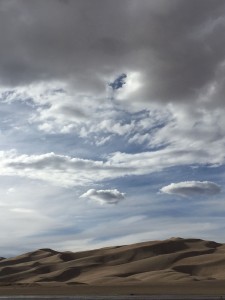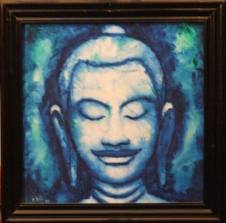Filtering Water In The Information Desert

It’s a desert out there.
In organizations, large transformation efforts create information deserts. Traditional sources of information dry up. We search for new sources but they’re few and far between. When we do find them, we can’t be sure if the information is tainted or pure. Should we consume it or not?
The lack of information creates additional stress. We know we’re going on a “journey” but we don’t know where. We don’t even know how we’ll know when we get there. Perhaps we’ll never get there. Perhaps we’ll just continue transforming.
We also know that there will be some winners and losers in the process. Some people will get plum assignments; others will be relegated to minor roles. It’s not always clear who will make these decisions or how they will be made. So we don’t know how to behave to improve our chances of success.
We also fear that we’ll lose something. We know what we have today. While it may not be all we want, just knowing what we have brings some degree of comfort. As the organization morphs, we don’t know what we’ll have tomorrow. We could be worse off. Our loss aversion bias makes the possibility of loss seem more likely – and more painful – than the possibility of gain.
When we’re in a real desert, we want to find water. Indeed, we want to find good water. Drinking bad water could be worse than drinking no water at all. So we carry water filtration systems. When we find water, we can purify it and ensure that it will help us rather than harm us.
Similarly, in an information desert, we want to find good, trustworthy sources of information. Since traditional sources of information have dried up, we need to find new sources. But how can we tell if the new sources are trustworthy? Perhaps they’re tainted with rumor and conjecture. Perhaps consuming the information will do us more harm than good.
It’s not easy to create accurate and effective information for a transforming organization. But there are some good filters that can help employees distinguish good information from bad. The simplest one I’ve found is called the triple filter. Some writers say that Socrates created the filters. Others claim Arab philosophers developed them. Regardless of the source, it’s a good communication technique to keep in mind.
According to legend, when someone offered Socrates information – especially information that might be based on conjecture or rumor, he asked three sets of questions:
- Is it true? How do we know? How can we verify it? What’s the source? What’s the evidence?
- Is it good? This is especially important if the information is about a person. Does it portray the person in a good light? Is it kind? Does it assume positive intent?
- Is it useful? Is the information useful to me, the recipient? Can I use it to accomplish something positive?
The process is analogous to deciding what evidence is admissible in court. If the information didn’t pass all three tests, Socrates simply refused to hear it.
I think of these questions as three steps in a linked process. If the information can’t pass the first test – truth — there’s not much point in asking the other two questions. If the information is verifiably true, then it’s useful to continue the process. If the information passes all three tests, then it’s admissible and should be considered in decision making.
Organizations in transition are under a great deal of stress. Bad information only increases the pressure. The triple filter doesn’t make the desert bloom but it helps employees find oases of trust and certitude in a difficult and demanding environment.
Critical Thinking Through the Ages
 As I’m teaching a course on critical thinking, I thought it would be useful to study the history of the concept. What have leading thinkers of the past conceived to be “critical thinking” and how have their perceptions changed over time?
As I’m teaching a course on critical thinking, I thought it would be useful to study the history of the concept. What have leading thinkers of the past conceived to be “critical thinking” and how have their perceptions changed over time?
One of the earliest — and most interesting –references that I’ve found is a sermon called the Kalama Sutta preached by the Buddha some five centuries before Christ. Often known as the “charter of free inquiry”, it lays out general tenets for discerning what is true.
Many religions hold that truth is revealed through scriptures or through institutions that are authorized to interpret scriptures. By contrast, Buddhism generally asserts that we have to ascertain truth for ourselves. So, how do we do that?
That was essentially the question that the Kalama people asked the Buddha when he passed through their village of Kesaputta. The Buddha’s sermon emphasizes the need to question statements asserted to be true. Further, the Buddha goes on to list multiple sources of error and cautions us to carefully examine assertions from those sources. According to Wikipedia, the Buddha identified the following sources of error:
- Oral histories
- Tradition
- New sources
- Scripture or other official documents
- Supposition
- Dogmatism
- Common sense
- Opinion
- Experts
- Authorities or one’s own teacher
Further, “Do not accept any doctrine from reverence, but first try it as gold is tried by fire.” The requires examination, reflection, and questioning and only that which is “conducive to the good” should be accepted as truth.
As Thanissaro Bhikkhu summarizes it, “any view or belief must be tested by the results it yields when put into practice; and — to guard against the possibility of any bias or limitations in one’s understanding of those results — they must further be checked against the experience of people who are wise.”
So how do the Buddhist commentaries compare to other philosophers? In the century after Buddha, Socrates is quoted as saying, “I know you won’t believe me, but the highest form of Human Excellence is to question oneself and others.” Almost 2,000 years later, Francis Bacon wrote, “Critical thinking is a desire to seek, patience to doubt, fondness to meditate, slowness to assert, readiness to consider, carefulness to dispose and set in order; and hatred for every kind of imposture.” A few hundred years later, Descartes wrote, “If you would be a real seeker after truth, it is necessary that at least once in your life you doubt, as far as possible, all things.” A hundred years after that, Voltaire wrote about the consequences of a failure of critical thinking, “Anyone who has the power to make you believe absurdities has the power to make you commit injustices.”
As the Swedes would say, there seems to be a “bright red thread” that ties all of these together. Go slowly. Ask questions. Be patient. Doubt your sources. Consider your own experience. Judge the evidence thoughtfully. For well over 2,000 years our philosophers — both Eastern and Western — have been saying essentially the same thing. It seems that we know what to do. Now all we have to do is to do it.